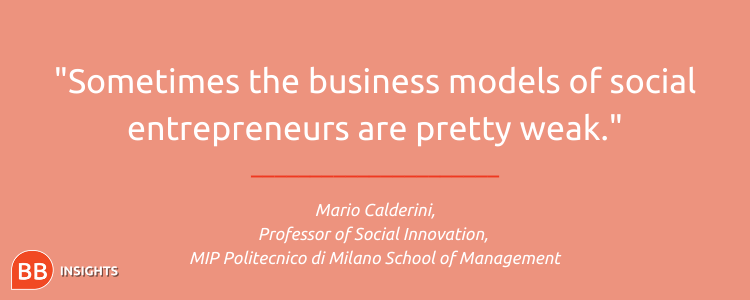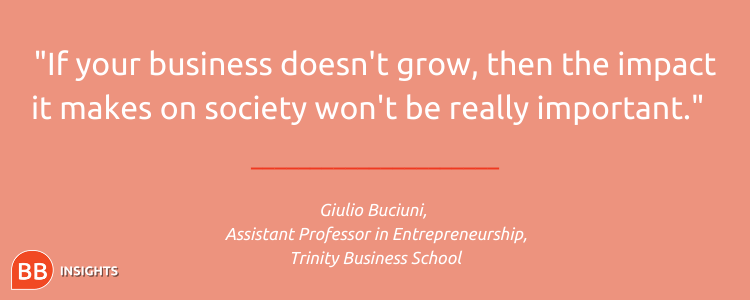The typical idea of an entrepreneur is an agile thinker and problem solver, someone who uses their knowledge or skills to create something new. For entrepreneurs, the aim is often to scale, maximize profits, and increase market share with their ideas.
But on the flip side, there is a wave of social entrepreneurs using their skills and knowledge to set up ventures prioritizing social impact, with the aim of solving social issues.
Social entrepreneurs “put purpose in front of profit,” explains Mario Calderini (pictured below, right), professor of social innovation at MIP Politecnico di Milano. And the movement is growing—30% of all social enterprises were founded in the last three years.
Turning away from profit-driven capitalism
There is evidence that the business sector is waking up to its social impact, thinks Désirée van Gorp, professor of international business at Nyenrode Business School.

“There is this trend in the business community that they have to step up and cannot just live by not doing harm to society, but by being more proactive and doing good,” she says.
There are now social enterprises seeking to tackle a whole range of issues.
Eco-search engine, Ecosia, plants a tree every 45 times people make a search query on the site. The company measures its success in the 113 million trees it has planted, rather than any money it makes.
Sustainable Italian fashion brand, Progretto Quid, creates clothing collections made from wasted materials to fight the wastage caused by fast fashion. The company also uses an inclusive hiring policy, employing people excluded from the labor force like trafficking victims, former drug addicts, and ex-prisoners.
Social entrepreneurship seems like an obvious choice for anyone wanting to make a difference to the world. But it isn’t always easy to scale and grow a social enterprise.

The challenges to social entrepreneurship
Social enterprises are usually met with two problems. The first being that a ‘purpose over profits’ model means many struggle to make money, which is needed to continue operating.
“Sometimes the business models of social entrepreneurs are pretty weak,” explains Mario from MIP. “They are very much focused on the social problem and not on the economic fundamentals.”
Low profitability leads to a second issue. Less profitable businesses are naturally less attractive to investment from venture capitalists or investment funds.

These serial investors search for potentially high growth sectors to invest in to maximize the returns on their investment further down the road. For startups, investors are an essential part of scaling your business.
The low profitability of social enterprises often means investors are more attracted to low-impact, highly profitable companies, causing a barrier to growth. “It is very seldom that social enterprises are able to scale and bring their solution to a structural level,” Mario says.
This has always been the fundamental flaw stopping social enterprises from having a widespread impact on society, thinks Giulio Buciuni (pictured right), assistant professor in entrepreneurship at Trinity Business School in Dublin.
“If your business doesn’t grow, then the impact it makes on society won’t be really important,” he says. “You have to scale, not because you are greedy, but because you want to maximize your impact on society.”

Is ESG investing the solution?
A shift has taken place in recent years, moving the objectives of investors and social enterprises closer together.
ESG criteria, which measure a company’s environmental, social, and governance operations, have become an important consideration in investing. Impact investors will now look at a company’s ESG performance, as well as their profits, when choosing where to put their money.
Investment in companies ranking highly for ESG stands at $12 trillion in the US in 2021, a 38% increase since 2016. This growth is part of an emphasis on social change within the business community, thinks Désirée (pictured right) from Nyenrode.

“It is a learning process and I see companies moving in that direction, a lot is happening now,” she says. This also reflects a wider change happening throughout society.
“The type of challenges that we face, there is not one stakeholder that can face it on their own,” she says, referring to issues like the climate crisis.
Maintaining an emphasis on social change, all the way from government, to business, to the public, is essential for keeping investors and entrepreneurs’ interests aligned, she believes.
“If there is a shared long-term perspective and an ecosystem with a purpose that everybody is committed to, that is the only way it will work.”
If successful, ESG investment could finally allow social entrepreneurship to have a large-scale impact. Moving from supporting small communities to tackling society’s most pressing issues.
“That entrepreneurial spirit, if it is done well across different areas, there is so much that can be done and it is so effective,” Désirée says. “I think it is the only way to find solutions to global challenges.”
Next Read:
Are Healthtech Advances A Good Thing For US Health Insurance Premiums?
BB Insights explores the latest research and trends from the business school classroom, drawing on the expertise of world-leading professors to inspire and inform current and future leaders



